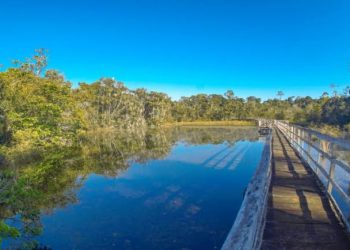English version in "Leia mais..."
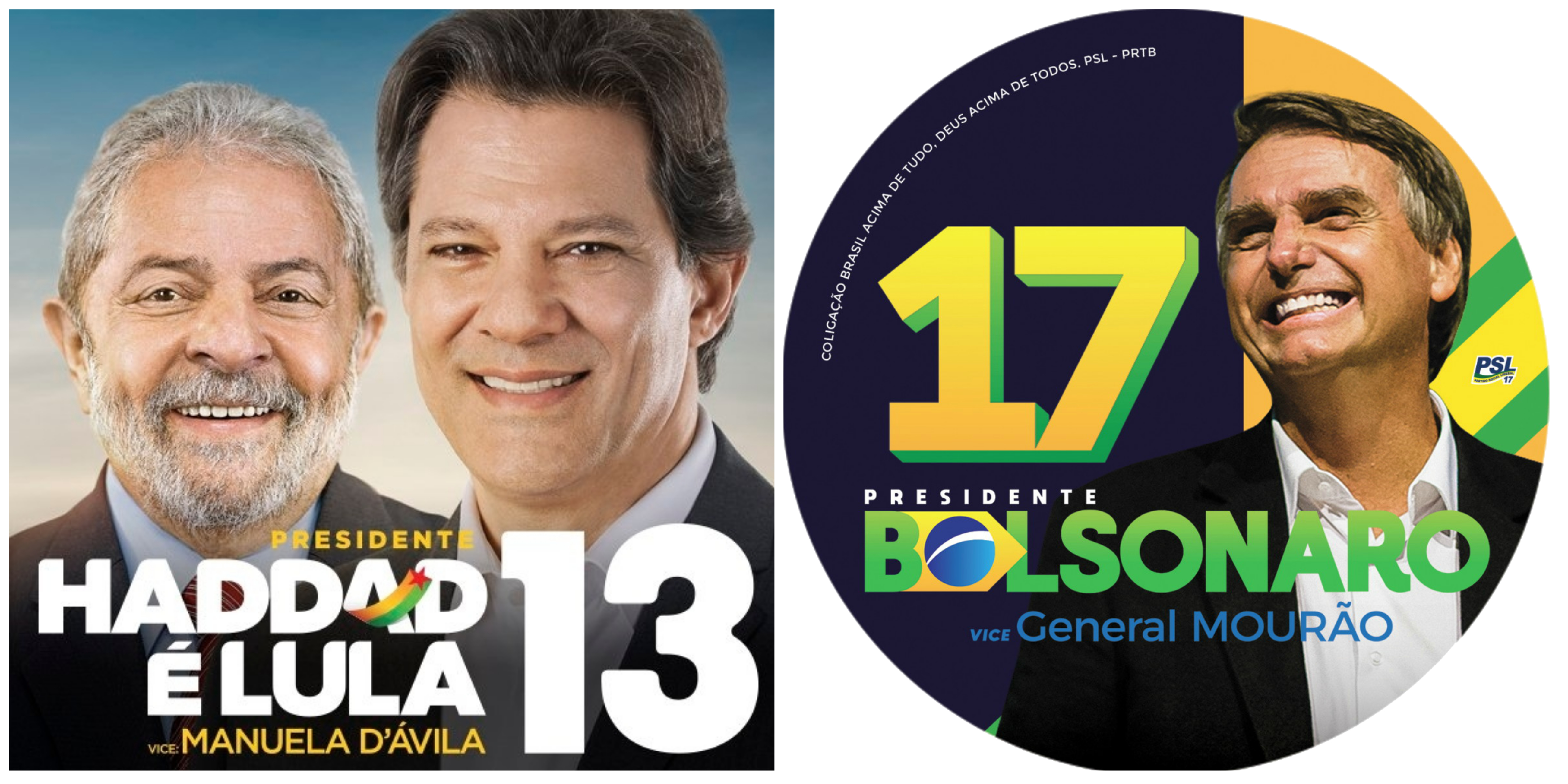
No final desse mês, dia 27 de Outubro de 2018, domingo, de 8:00 às 17:00h será a oportunidade de escolhermos o presidente e vice-presidente do nosso país.
O 1º turno aconteceu no dia 7 do mesmo mês e 55% dos eleitores do Brasil votaram nos candidatos Fernando Haddad (PT) e Jair Bolsonaro (PSL).
Durante os quatro anos seguintes, o líder do Poder Executivo deve governar o povo e administrar os interesses públicos, de acordo com as leis previstas na Constituição Federal. Cabe ao presidente encaminhar ao Congresso Nacional projetos de lei, como a criação de universidades federais, de cargos e funções na administração federal ou criação e extinção de ministérios, etc. Mas apenas os parlamentares aprovam.
Como sabemos, as pautas ambientais nunca foram o foco principal nos debates presidenciais. Entretanto, esse tema não pode ser alheio a população, pois há relação ampla com crescimento econômico, saúde pública, segurança hídrica e alimentar e distribuição de riqueza. Por exemplo, a Frente Parlamentar Ambientalista divulgou recomendações com o objetivo de colocar a agenda ambiental na pauta dos candidatos à presidência. “Em linhas gerais, o grupo pede atenção para temas como desmatamento ilegal zero, proteção dos mananciais e o fortalecimento das unidades de conservação e das terras indígenas e quilombolas. As propostas foram elaboradas junto com organizações da sociedade civil” – publicado no Oeco.
O objetivo deste texto é expor as propostas de ambos os candidatos, de forma neutra, a fim de ampliar a divulgação de um tema pouco abordado nas agendas, nas propostas de governo e nos debates. Além de comparar a quantidade de termos ambientais escritos em cada programa (Tabela 1). Assim como foi realizado na eleição de 2016 para a prefeitura do Rio de Janeiro.
Jair Bolsonaro
A proposta de governo do candidato mais votado (49.276.990 eleitores) é apresentada em 81 slides, compreendendo os temas “valores e compromissos” e suas “linhas de ação” compostas por “segurança e combate a corrupção”, “saúde e educação” e “economia e infraestrutura”.
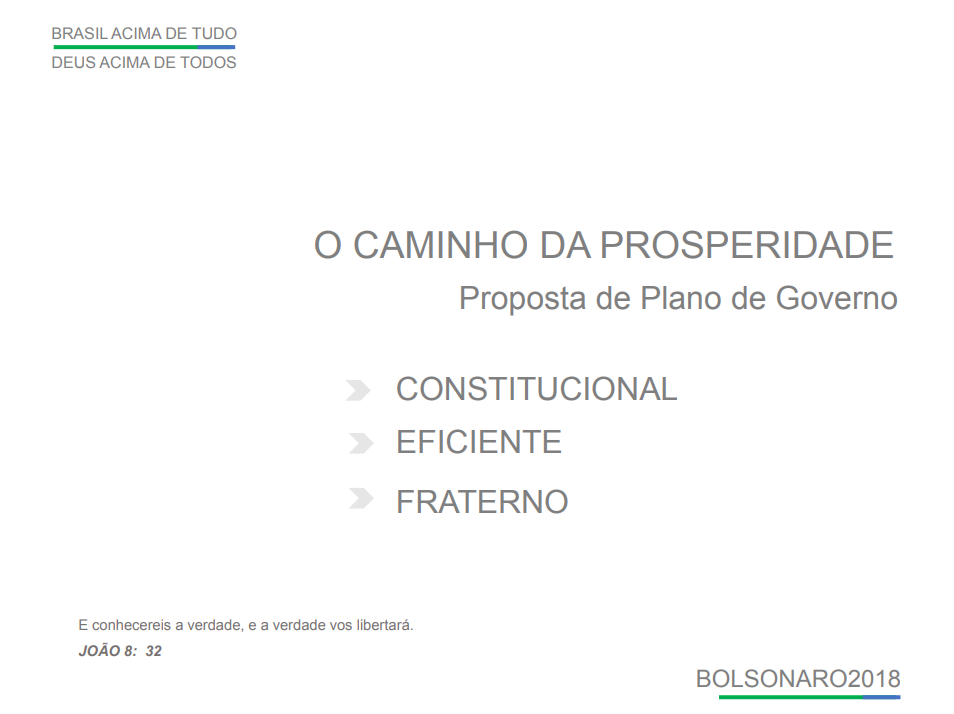
Na sua última “linha de ação”, em “economia e infraestrutura”, no slide 68, há a proposta de uma “nova estrutura federal agropecuária” com duas atribuições mais relacionadas a área ambiental como:
- Recursos Naturais e Meio Ambiente Rural
- Desenvolvimento Rural Sustentável
“Tais atribuições seriam exercidas dentro da nova forma de gestão, através de indicadores que permitam identificar e monitorar o andamento de cada programa.”
Ainda em “economia e infraestrutura”, no subtópico “petróleo e gás”, não relaciona o investimento de energias renováveis e a redução nas emissões de CO2 com a preservação ambiental. Porém o documento expõe que “o gás tem ganho destaque na matriz energética brasileira, contribuindo na transição para reduzir as emissões de CO2 e ajudar a integrar outras fontes renováveis intermitentes” (que inclui a eólica e a fotovoltaica). Mesmo assim, em entrevista ao Reuters (03/09/18), o candidato afirma que pode retirar o Brasil do Acordo de Paris, tratado assinado por 195 países para reduzir as emissões de gases de efeito estufa (GEE): “tem muita reserva superdimensionada”. Inclusive, Espanha e Chile pedem para Brasil continuar no Acordo de Paris.
Discorrendo sobre os problemas e solução da energia cita, como exemplo, que “as Pequenas Centrais Hidrelétricas têm enfrentado barreiras quase intransponíveis no licenciamento ambiental. Há casos que superam os dez anos. Faremos com que o licenciamento seja avaliado em um prazo máximo de três meses.”
Notícias atuais e passadas do candidato relacionadas ao meio ambiente foram destacadas
Em entrevista à TV Bandeirantes (09/10/18), após a definição do segundo turno, o candidato fala sobre os incentivos para os produtores do campo como “acabar com o fim da indústria da multa. ICMBio e IBAMA. Parte dos fiscais vão pro campo pra multar os caras, prejudicando quem quer produzir.” E sobre suas parcerias parlamentares “o último grande grupo de parlamentares que fecharam comigo foi a bancada do campo”.
Quando ele fala sobre as questões do campo “temos que tipificar as ações do MST como terrorismo. Eles não produzem nada. Produzem apenas terror. Levam insegurança ao campo. Devemos, por exemplo, para acabar com a briga do Ministério do Meio Ambiente com a Agricultura, nós vamos fundir os ministérios. Não pode ter esse ativismo xiita ambiental no Brasil.”
Em entrevista aO Estado de S. Paulo (11/10/18), o provável ministro dos transportes, general Oswaldo Ferreira critica a área ambiental e o IBAMA: “quando eu construí estrada, não tinha nem Ministério Público nem o Ibama (…) derrubei todas as árvores que tinha à frente, sem ninguém encher o saco.” Mas diz também: “ninguém é maluco de ser contra o meio ambiente, mas precisamos esclarecer logo o que pode e o que não pode ser feito”.
Em 2012, o candidato teria pescado na Ilha de Samambaia, porção marítima da Estação Ecológica de Tamoios, em Angra dos Reis (RJ), local onde é proibida a atividade, mas foi suspenso julgamento de inquérito por crime ambiental.
Fernando Haddad
O Plano de governo do segundo candidato mais votado (31.342.005 eleitores) é apresentado em 61 páginas, compreendendo 5 tópicos principais:
- SOBERANIA NACIONAL E POPULAR NA REFUNDAÇÃO DEMOCRÁTICA DO BRASIL
- INAUGURAR UM NOVO PERÍODO HISTÓRICO DE AFIRMAÇÃO DE DIREITOS
- NOVO PACTO FEDERATIVO PARA PROMOÇÃO DOS DIREITOS SOCIAIS
- PROMOVER UM NOVO PROJETO NACIONAL DE DESENVOLVIMENTO
- TRANSIÇÃO ECOLÓGICA PARA A NOVA SOCIEDADE DO SÉCULO XXI
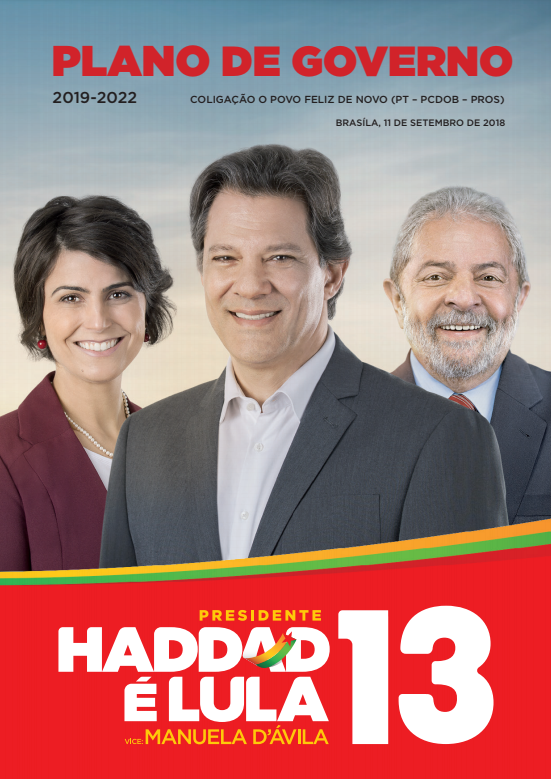
No tópico que está diretamente relacionado com o tema meio ambiente é “transição ecológica para a nova sociedade do século XXI”, que contém 12 páginas. E possui 6 subtópicos pautados nas práticas, tecnologias e inovações verdes, as quais irão auxiliar a criar melhores e mais empregos a longo prazo para o crescimento inclusivo. Diante da crise ambiental, “os investimentos em agroecologia e na mudança da estrutura produtiva
vão garantir um futuro moderno e sustentável em que todos possam respirar ar limpo, beber água potável, comer alimentos saudáveis, usufruir de mares e rios salubres, viver com saúde, ter empregos dignos e se orgulhar de suas raízes, sejam elas da cidade ou do campo.
Na economia de baixo impacto ambiental e alto valor agregado (pág. 48):
- Acumulando competências e aprendizados para inovar
- Políticas de financiamento e Reforma Fiscal verde
- Infraestrutura sustentável para o desenvolvimento
- Sustentabilidade e soberania energética
- Diversificando a matriz de transporte
- Novo modelo de mineração
Na promoção do direito humano à água e ao saneamento (pág. 50), o candidato reconhece “o acesso universal à água e ao saneamento como um direito fundamental que deve pautar todas as políticas públicas referentes à segurança hídrica. Por isso, atuará fortemente para garantir a oferta de água para todos e todas com qualidade e regularidade, em sintonia com as metas do Objetivo do Desenvolvimento Sustentável (ODS) de Água e Saneamento da ONU”.
No viver bem nas cidades (pág. 51):
- Novo marco regulatório de desenvolvimento urbano
- Garantindo o direito à moradia
- Diálogo federativo na construção de soluções para os problemas urbanos
- Mobilidade e acessibilidade urbana: uma cidade ágil que valoriza a vida
- Cidades resilientes, menos poluídas e mais iluminadas
- Gestão de resíduos
No viver bem no campo (pag. 55):
- Produzir alimentos saudáveis
- Políticas para o agronegócio
- Democratização da terra e reforma agrária
- Fortalecer a agricultura familiar de base agroecológica
- Aquicultura e pesca
- Direitos humanos e sociais no campo
- Viver bem no semiárido
- Proteção e defesa dos animais
No desmatamento zero, proteção da sociobiodiversidade e o papel da Amazônia na transição ecológica (pág. 58), destaca o aumento na eficiência das atividades agropecuárias em áreas já desmatadas e o fim da expansão do arco do desmatamento, preservando a biodiversidade e provendo os serviços ecossistêmicos.
Na nova governança para a transição ecológica (pág. 59), está inserido o tópico sobre a educação ambiental através de uma consistente política pública. Reconhecendo a necessidade de uma temática transversal, permanente, continuada e articulada com participação social.
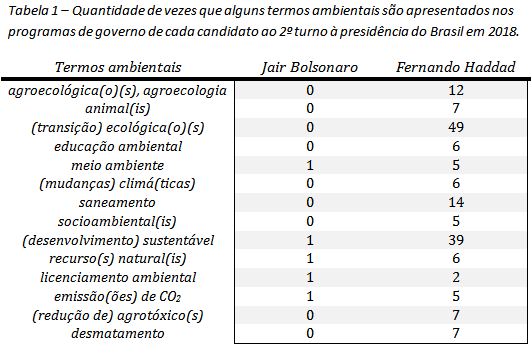
Environmental Guidelines: A Comparison of Government Programs and Background of Candidates of the 2nd Round to the Presidency of Brazil in 2018
At the end of this month, October 27, 2018, Sunday, from 8:00 am to 5:00 pm will be the opportunity to choose the president and vice president of our country.
The first round took place on the 7th of the same month and 55% of Brazil’s voters voted for candidates Fernando Haddad (PT) and Jair Bolsonaro (PSL).
For the next four years, the executive branch leader must govern the people and administer public interests, according to the laws provided for in the Federal Constitution. It is up to the president to submit bills to the National Congress, such as the creation of federal universities, positions and functions in the federal administration, or creation and extinction of ministries, etc. But only the parliamentarians approve.
As we all know, environmental guidelines have never been the main focus in presidential debates. However, this issue can not be alien to the population, since there is a broad relationship with economic growth, public health, water and food security, and wealth distribution. For example, the Frente Parlamentar Ambientalista has issued recommendations aimed at putting the environmental agenda on the agenda of presidential candidates. “In general terms, the group calls attention to issues such as zero illegal deforestation, protection of water sources and the strengthening of conservation units and indigenous lands and quilombolas.
The purpose of this text is to expose the proposals of both candidates, in a neutral way, in order to broaden the dissemination of a topic that is little discussed in the agendas, in the proposals of government and in the debates. In addition to comparing the amount of environmental terms written in each program (Table 1). As was done in the 2016 election for the city of Rio de Janeiro.
Jair Bolsonaro
The proposal for a government of the most voted candidate (49,276,990 voters) is presented on 81 slides, comprising the themes “values and commitments” and their “lines of action” composed of “security and fight against corruption”, “health and education” and “economy and infrastructure”.
In its last “line of action”, in “economy and infrastructure”, on slide 68, there is the proposal of a “new federal agricultural structure” with two attributions more related to environmental area such as:
- Natural Resources and Rural Environment
- Sustainable Rural Development
“Such attributions would be exercised within the new form of management, through indicators that allow identifying and monitoring the progress of each program.”
Still in “economy and infrastructure”, in the subtopic “oil and gas”, does not relate the investment of renewable energy and the reduction in CO2 emissions with environmental preservation. But the document states that “gas has gained prominence in the Brazilian energy matrix, contributing to the transition to reduce CO2 emissions and help integrate other intermittent renewable sources” (which includes wind and photovoltaic). Even so, in an interview with Reuters (03/09/18), the candidate states that he can withdraw Brazil from the Paris Agreement, a treaty signed by 195 countries to reduce emissions of greenhouse gases (GHG): “there is a lot of reserve oversized. ” In addition, Spain and Chile ask Brazil to continue in the Paris Agreement.
Discussing the problems and solution of energy cites, as an example, that “the Small Hydroelectric Power Plants have faced almost insurmountable barriers to environmental licensing, there are cases that are over ten years old, we will cause the license to be evaluated in a maximum period of three months”.
In an interview with TV Bandeirantes (09/10/18), after the definition of the second round, the candidate talks about the incentives for the producers of the field as “to end the industry of the fine. ICMBio and IBAMA. Some of the inspectors go to the field to fine the guys, harming who they want to produce”. And about their parliamentary partnerships “the last large group of parliamentarians who closed with me was the field bench”.
When he talks about the issues in the field, “we have to classify the actions of the MST as terrorism.” They produce nothing, they produce only terror, they bring insecurity to the field. Agriculture, we are going to merge the ministries. You can not have this Shiite environmental activism in Brazil. “
In an interview with O Estado de S. Paulo (10/11/18), the probable transport minister, General Oswaldo Ferreira criticizes the environmental area and IBAMA: “When I built the road, I had neither the Public Prosecutor nor Ibama (.. .) I overturned all the trees in front of me, without anyone filling the sack. ” But he also says: “No one is crazy about being against the environment, but we need to clarify at once what can and can not be done.”
In 2012, the candidate would have fished on the Island of Samambaia, a portion of the Tamoios Ecological Station, in Angra dos Reis (RJ), where the activity is banned, but an investigation was suspended for environmental crime, pending an environmental crime investigation .
Fernando Haddad
The Governing Plan of the second most voted candidate (31,342,005 voters) is presented in 61 pages, comprising 5 main topics:
- NATIONAL AND POPULAR SOVEREIGNTY IN DEMOCRATIC REFORMS OF BRAZIL
- INAUGURATE A NEW HISTORICAL PERIOD OF AFFIRMATION OF RIGHTS
- NEW FEDERATIVE PACT FOR THE PROMOTION OF SOCIAL RIGHTS
- PROMOTING A NEW NATIONAL DEVELOPMENT PROJECT
- ECOLOGICAL TRANSITION TO THE NEW SOCIETY OF THE 21ST CENTURY
In the topic that is directly related to the environment theme is “ecological transition to the new society of the 21st century,” which contains 12 pages. And it has 6 subtopics based on green practices, technologies and innovations, which will help create better and more long-term jobs for inclusive growth. Facing the environmental crisis, “investments in agroecology and in the change of the productive structure
ensure a modern and sustainable future in which everyone can breathe clean air, drink safe water, eat healthy food, enjoy healthy seas and rivers, live healthily, have decent jobs and take pride in their roots, be they city or country.
In the economy with low environmental impact and high added value (page 48):
- Accumulating skills and learning to innovate
- Financing policies and green tax reform
- Sustainable infrastructure for development
- Sustainability and energy sovereignty
- Diversifying the transport matrix
- New mining model
In promoting the human right to water and sanitation (page 50), the candidate recognizes “universal access to water and sanitation as a fundamental right that should guide all public policies concerning water security. Therefore, it will act strongly to guarantee the supply of water for all, with quality and regularity, in line with the goals of the UN Sustainable Water and Sanitation Development Objective. “]
In living well in the cities (page 51):
- New regulatory framework for urban development
- Guaranteeing the right to housing
- Federative dialogue in the construction of solutions to urban problems
- Mobility and urban accessibility: an agile city that values life
- Resilient, less polluted and brighter cities
- Waste Management
In living well in the countryside (page 55):
- Produce healthy food
- Policies for agribusiness
- Democratization of land and land reform
- Strengthen family-based agro-ecological agriculture
- Aquaculture and fishing
- Human and social rights in the countryside
- Living well in the semi-arid
- Protection and protection of animals
In the case of zero deforestation, protection of socio-biodiversity and the role of the Amazon in the ecological transition (page 58), the increase in the efficiency of agricultural activities in areas already deforested and the end of the expansion of the deforestation arc, preserving biodiversity and providing services ecosystems.
In the new governance for the ecological transition (page 59), the topic on environmental education is inserted through a consistent public policy. Recognizing the need for a transversal, permanent, continuous and articulated theme with social participation.

